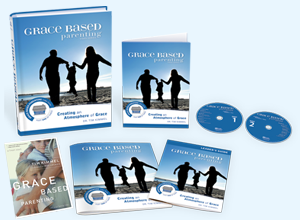Session 3 - Balancing Grace and Truth
Answering the Naysayers
As we learn to be grace based parents, let’s deal with a common pushback to this parenting model. I hear it all the time. Someone says, “Grace-based parenting is just a fancy term for letting kids get away with everything. It’s all ‘nice’ and ‘happy’ stuff with no moral backbone. Kids need parents to be tough! They need tight boundaries. They need discipline!”
I’m not sure what this person is talking about, but it isn’t grace-based parenting. There is nothing about grace that turns parents into pushovers. There’s nothing about grace that lets kids do whatever they want. When you understand grace as it is outlined in the Bible, you recognize that it isn’t a lower standard; it’s a higher one. It isn’t a hideaway for weak-willed parents; it’s a safe harbor for strong, calm, and confident ones.
Grace is a perfectly balanced merger of clear rules (and responsibilities) with a heart-connected relationship. But don’t take my opinion on this; let’s let the Bible speak for itself. More importantly, let’s let Jesus stand on His own résumé.
In the gospel of John, chapter 1, verse 14, the apostle John says this of Jesus: “The Word [another name for Jesus] became flesh and made his dwelling among us. We have seen his glory, the glory of the One and Only, who came from the Father, full of grace and truth.”
Grace and truth
Jesus was the embodiment of these two important parts of family dynamics. He wasn’t a little bit of grace and a lot of truth, or a lot of grace and a little bit of truth. He was the balanced and fused representation of both of these important values in their entirety. The naysayers of grace based parenting are usually people who camp on the truth side of the equation. “You need to have strict rules and high standards to raise kids,” they say. The assumption is that grace goes light on these things.
No, it doesn’t. Jesus didn’t. He applied the standards with an overwhelming love for the people who struggled with them. True grace is the kind treatment of another person while still upholding clear moral principles.
The Alloy of Grace
Perhaps a visit to a foundry can help us understand the balance that grace brings to our role as parents. If you melt tin with copper, you get an alloy called bronze. The alloy is no longer made up of tin and copper. You can’t separate the tin from the copper. It’s bronze. It’s something completely new and different than the two elements that were blended to make it.
Grace is an alloy of favor and truth mixed together to become one. If you show favor but don’t hold to the truth, your parenting strategy sways to the toxic extreme of license. If you hold hard and fast to the rules but do so without any regard to the struggle going on within your child or how your enforcement of the rules is affecting them, your parenting strategy sways to the toxic extreme of law. It’s not uncommon for law-oriented parents to flesh out God’s absolute standards in ways that have no reference point to God’s heart or his Word. This becomes legalism.
Legalistic parents define devotion and obedience to God as well as obedience to themselves in terms of arbitrary rules and spiritual checklists that often have no actual reference point in the Bible (such as “Nice Christian kids don’t listen to rap music, or do weird things with their hair,” etc.). John 1:17 says, “For the law was given through Moses; grace and truth came through Jesus Christ.”
If you really want to ramp up the hostility between you and your kids as well as shove a wedge between them and God, just fall to one extreme side of this equation or the other. And we can’t think that a license-leaning mother and a law-leaning father make one complete grace-based parent. It doesn’t work that way. False grace and false truth combined just make trouble. Parents who want to use grace as the standard for bringing the best out of their children must be a fusion, or alloy, of favor and truth individually as well as a couple.
Minimizing Rebellion and Resentment
The alloy of grace—this melting together of favor and truth—saves a parent so much grief when it comes to their relationship with their children. That’s because effective parenting is a balance between establishing and enforcing rules and maintaining a close relationship with a child’s heart. Grace helps us avoid falling to one side or the other.
Adapted from the book, Discover Your Child’s Heart with the Kids Flag Page by Dr. Tim Kimmel





